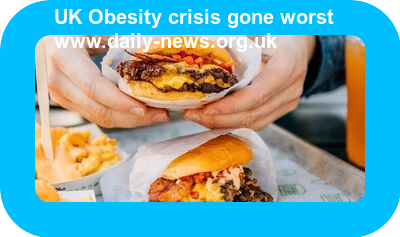UK Obesity Crisis Costs Surge to £98 Billion The UK is grappling with a staggering financial burden of £98 billion attributed to the burgeoning crisis of obesity, marking an alarming surge from £58 billion in 2020.

Highlighting the severity of the situation, Henry Dimbleby, the government’s former food adviser, labeled it an “absolute public health disaster.”
The escalated costs, unveiled by the Tony Blair Institute, present a grim reality: expenses for affected individuals have surged from £45.2 billion to £63.1 billion annually.
Concurrently, the strain on the NHS has swelled from £10.8 billion to £19.2 billion, based on analyses conducted by Frontier Economics for the think tank.
You May Also Like: Four Habits Linked To Dimentia- New Research
However, the most profound escalation emerges from the societal toll, with an unprecedented 2.4 million individuals rendered unfit for work due to obesity-related conditions.
Financial Burden on the Exchequer
This surge translates into a financial burden soaring by £2.1 billion, now standing at £15.6 billion. This encompassed not only financial costs but also quantified the health deterioration attributable to illnesses or weight-related ailments.
Critically, Dimbleby underscored the pivotal role of dietary factors, attributing three of the primary illnesses hindering these 2.4 million individuals from gainful employment—type 2 diabetes, high blood pressure, and musculoskeletal conditions—to food-related causes.
Moreover, he emphasized the exacerbation of mental health conditions due to unhealthy eating habits.
The solution proposed by Dimbleby involves breaking the pervasive “junk food cycle.” He advocates for a 30% increase in fruit and vegetable consumption, a 50% boost in fiber intake, and a 25% reduction in the consumption of high-fat, high-salt, or high-sugar foods.

Integral to his strategy is a nationwide initiative to impart cooking skills to the younger populace during their school years, narrowing the gap between those proficient in cooking from scratch and those reliant on pre-prepared meals.
Echoing Dimbleby’s sentiment, the focus turns to the government’s role in addressing the root causes within the food industry.
He highlights the need to champion fresh food over processed alternatives, expressing concern over a potential scenario where a third of the British population could be dependent on medications like Ozempic and Wegovy.
Katharine Jenner Presses for Action
Supporting this urgency for action, Katharine Jenner, director of the Obesity Health Alliance, cast a critical eye on the government’s faltering efforts.
Despite possessing a plan to combat obesity, she notes a glaring failure in its implementation as evidenced by the astronomical rise in costs to £98 billion.
Jenner emphasized the metamorphosis of the food landscape over the past three decades, from a paradigm where half the population faced overweight or obesity to a harrowing scenario where two-thirds now grapple with it.
She underscored the environmental transformation into an ‘obesogenic environment’, citing ubiquitous unhealthy food availability—on screens, in stores, on high streets, and in workplaces.
The urgency in addressing this crisis resonates in Jenner’s caution against solely treating individuals without rectifying the environmental factors fostering illness.
Without tackling the root causes ingrained in the environment, she warned of continued exorbitant spending in the NHS with minimal long-term benefits.
As the nation grapples with these skyrocketing costs and an escalating health crisis, the resounding call remains for comprehensive interventions that not only treat the symptoms but fundamentally reshape the environments fostering the obesity epidemic.

